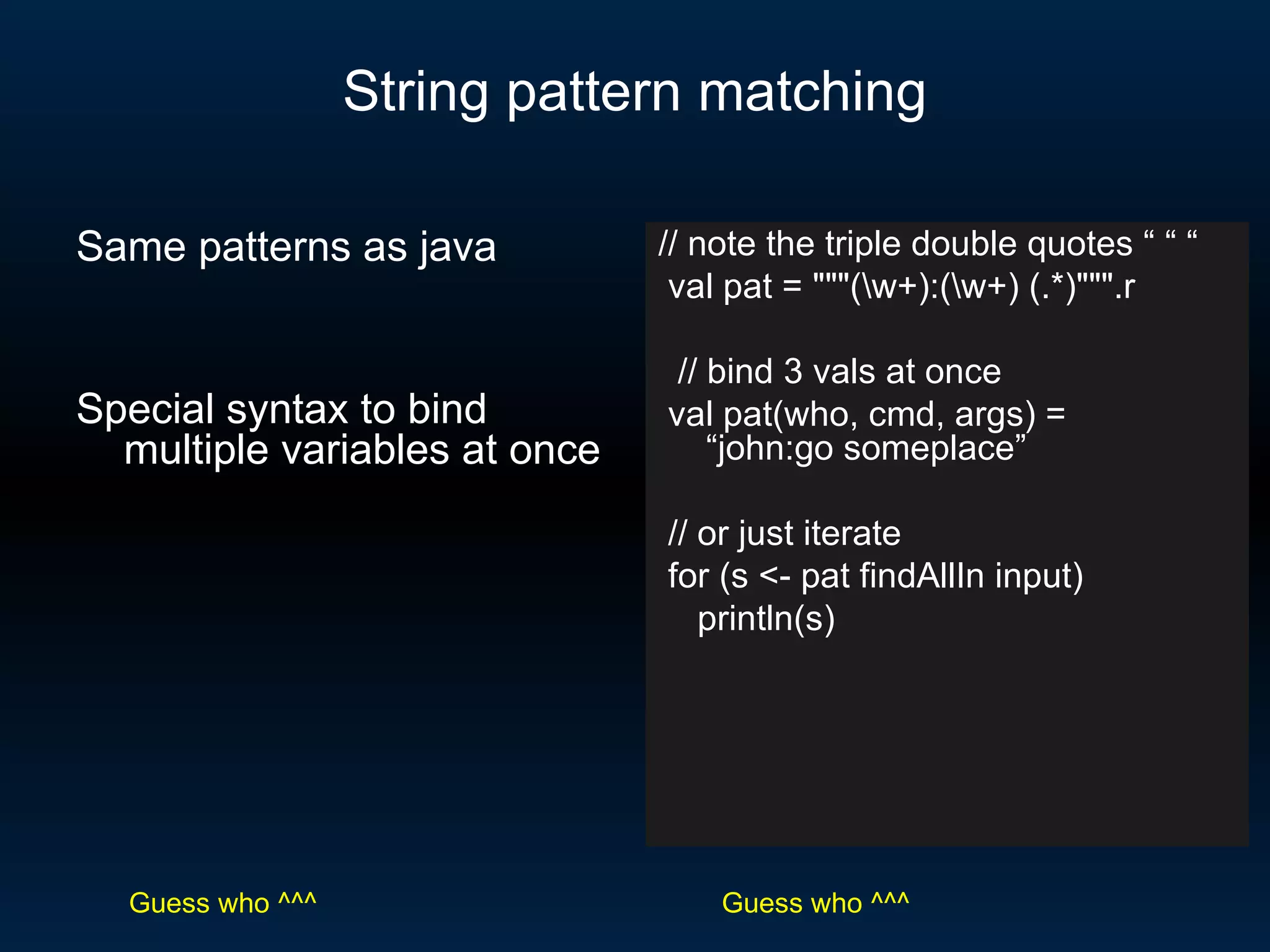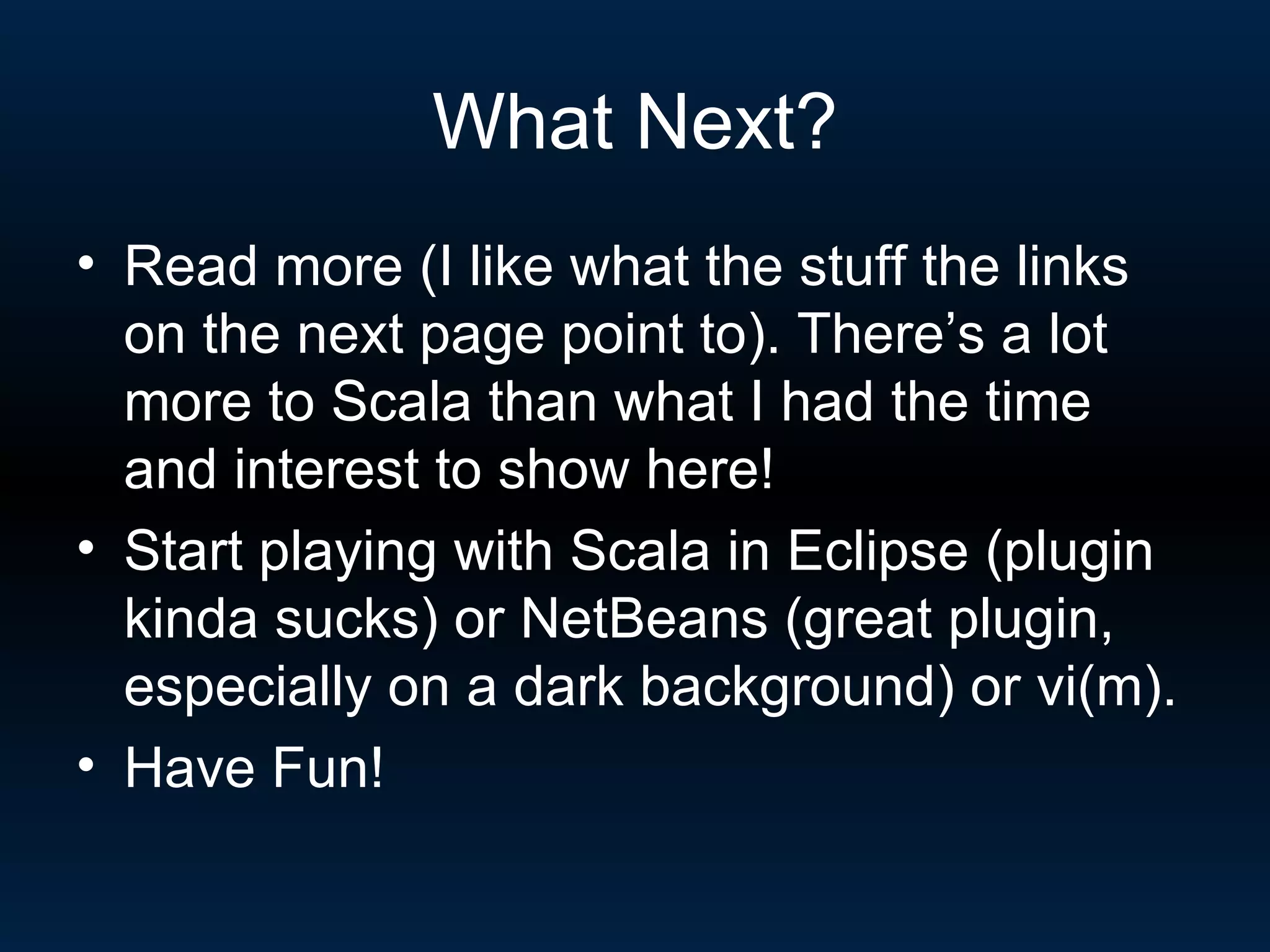Scala is a multi-paradigm language that runs on the JVM and interoperates with Java code and libraries. It combines object-oriented and functional programming by allowing functions to be treated as objects and supports features like traits, pattern matching, and immutable data structures. The Scala compiler infers types and generates boilerplate code like getters/setters, making development more productive compared to Java. While Scala has a learning curve, it allows a more concise and scalable language for building applications.
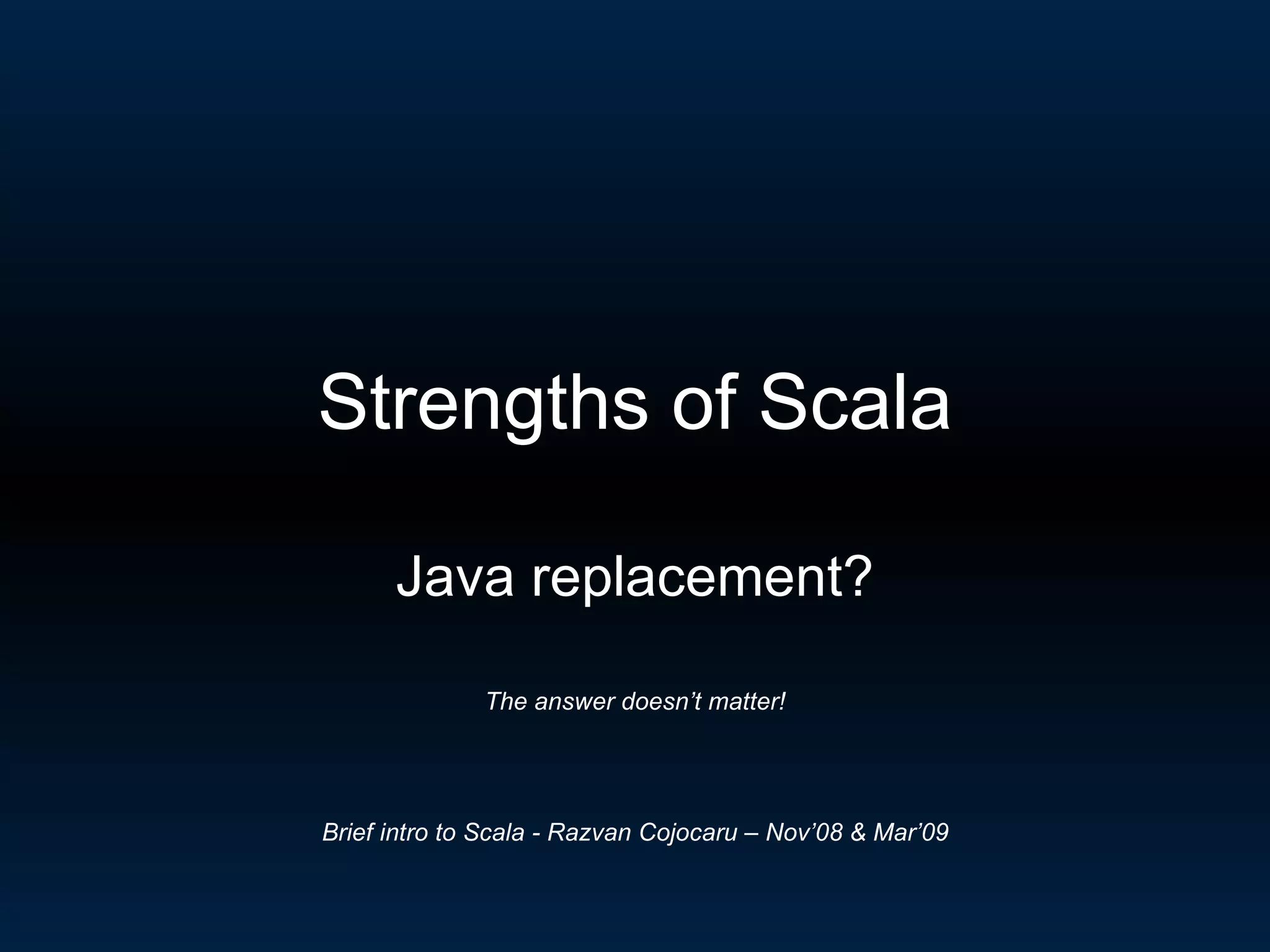
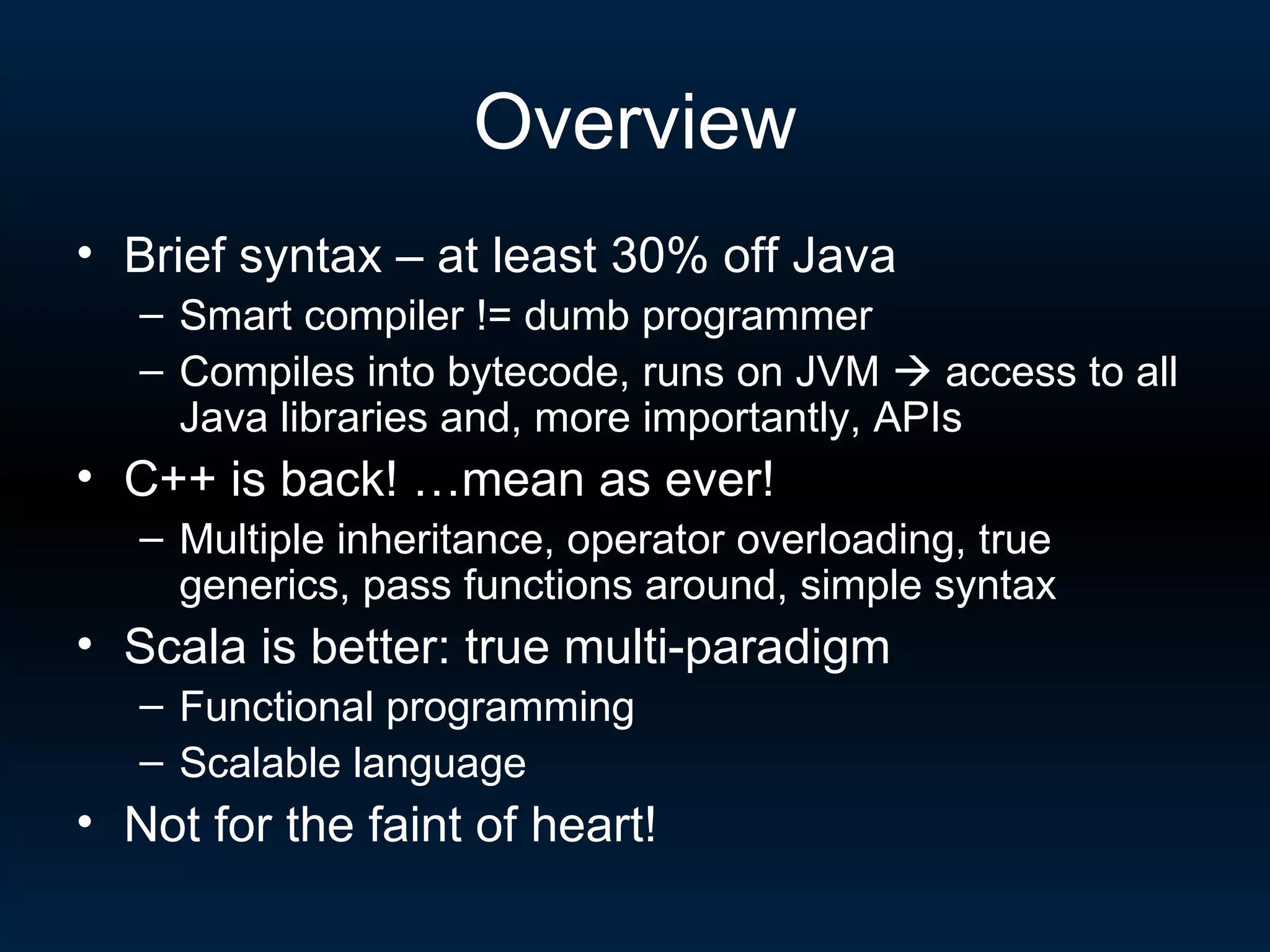
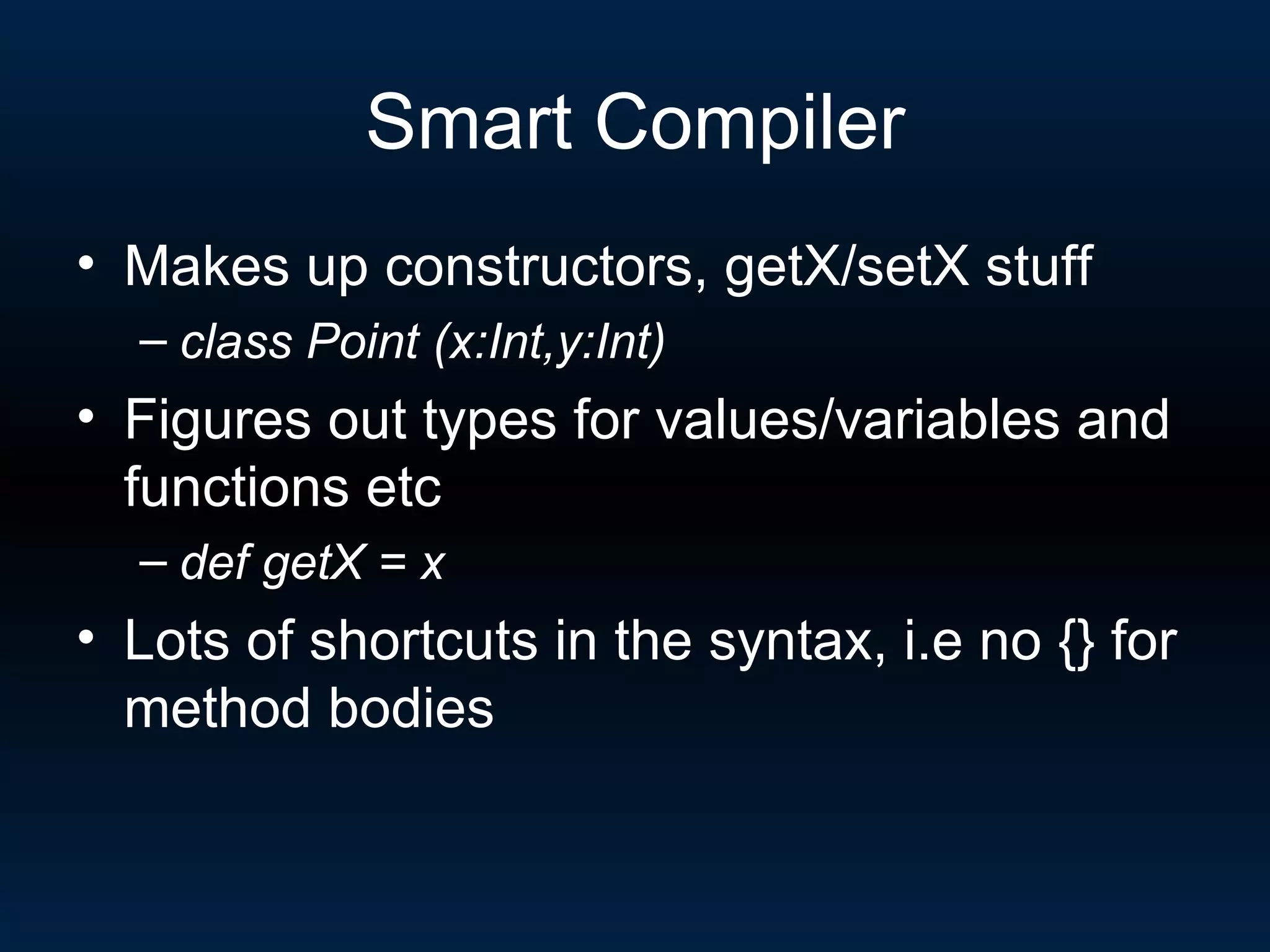
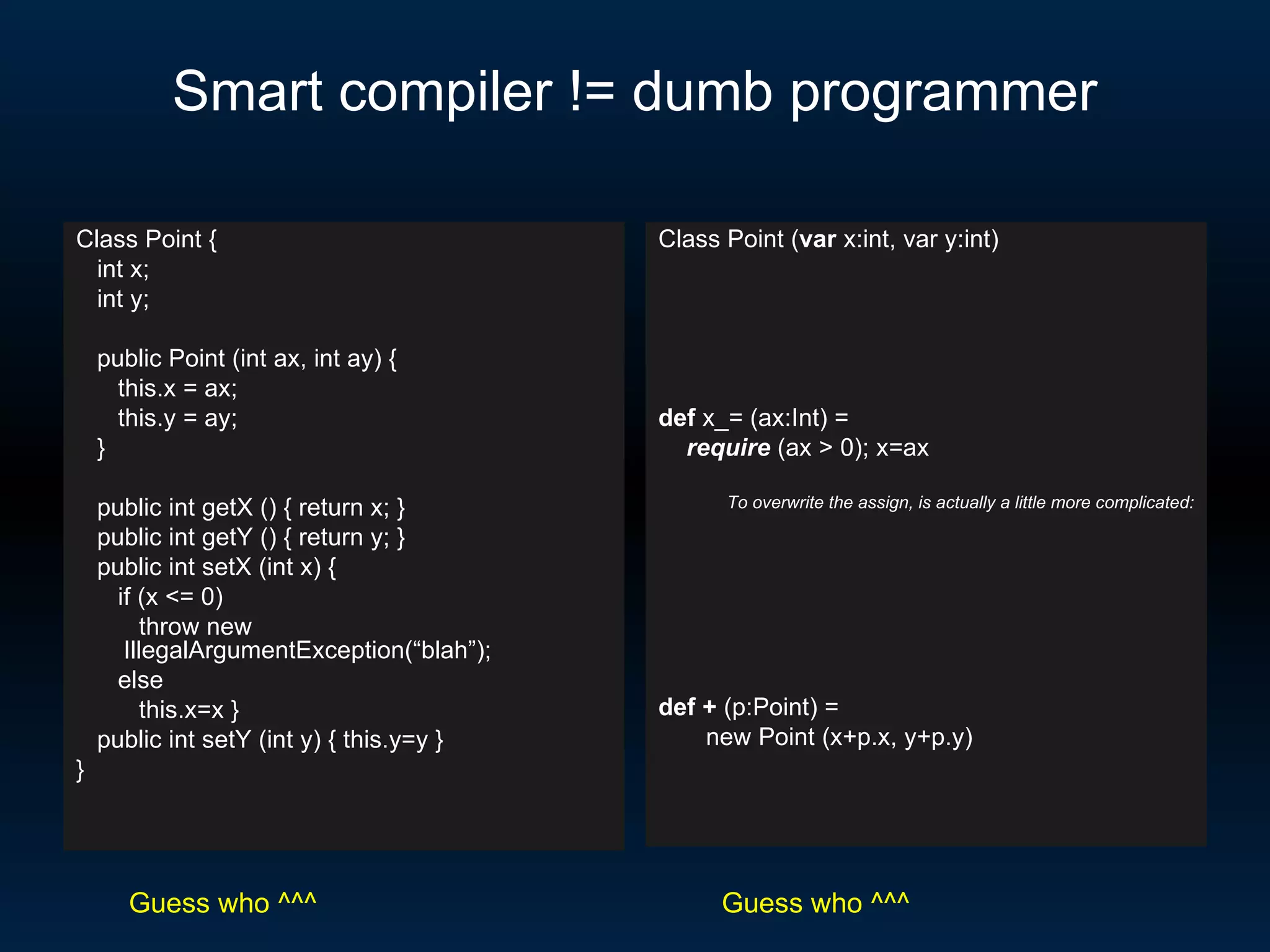
![Constructor/field generation class SimplerPoint ( private var ix : Int, private var iy :Int) { def x = ix def y = iy def x_= ( ax :Int) { require( ax >0); ix = ax } def y_= ( ay :Int) { require( ay >0); iy = ay } } class Point (ax:Int, ay:Int) { private[this] var ix :Int = ax private[this] var iy :Int = ay def x = ix def y = iy def x_= (ax:Int) { require(ax>0); ix =ax } def y_= (ay:Int) { require(ay>0); iy =ay } } // check this out !!! class Point (ax:Int, ay:Int) { require(ax>0); // class body is in fact c-tor private[this] var ix :Int = ax def x_= (ax:Int) { require(ax>0); ix =ax } } Ix/iy are both constructor and fields Classic: ax/ay are just args for constructor](https://image.slidesharecdn.com/scala-1234561616732071-2/75/Scala-brief-intro-5-2048.jpg)
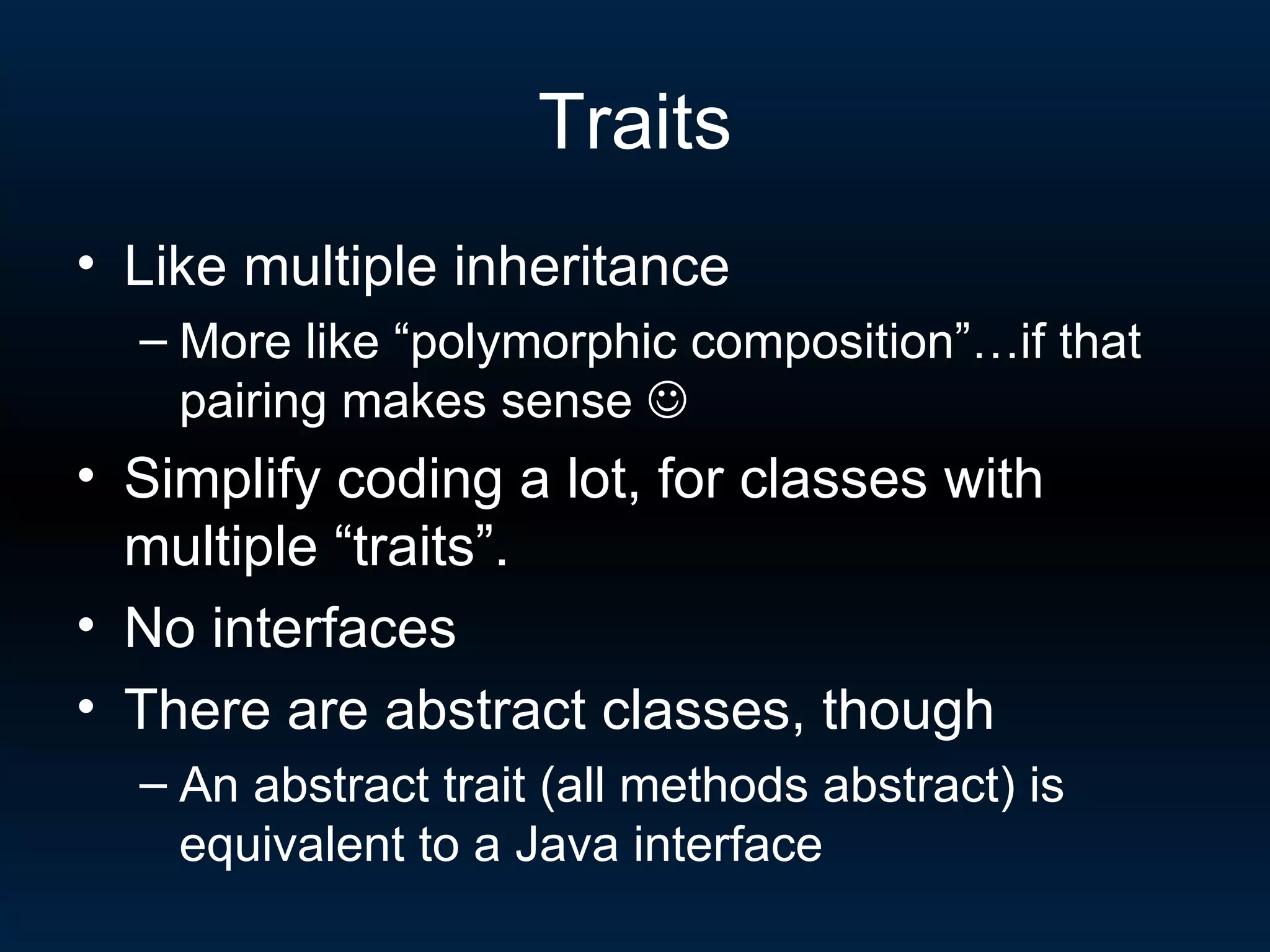
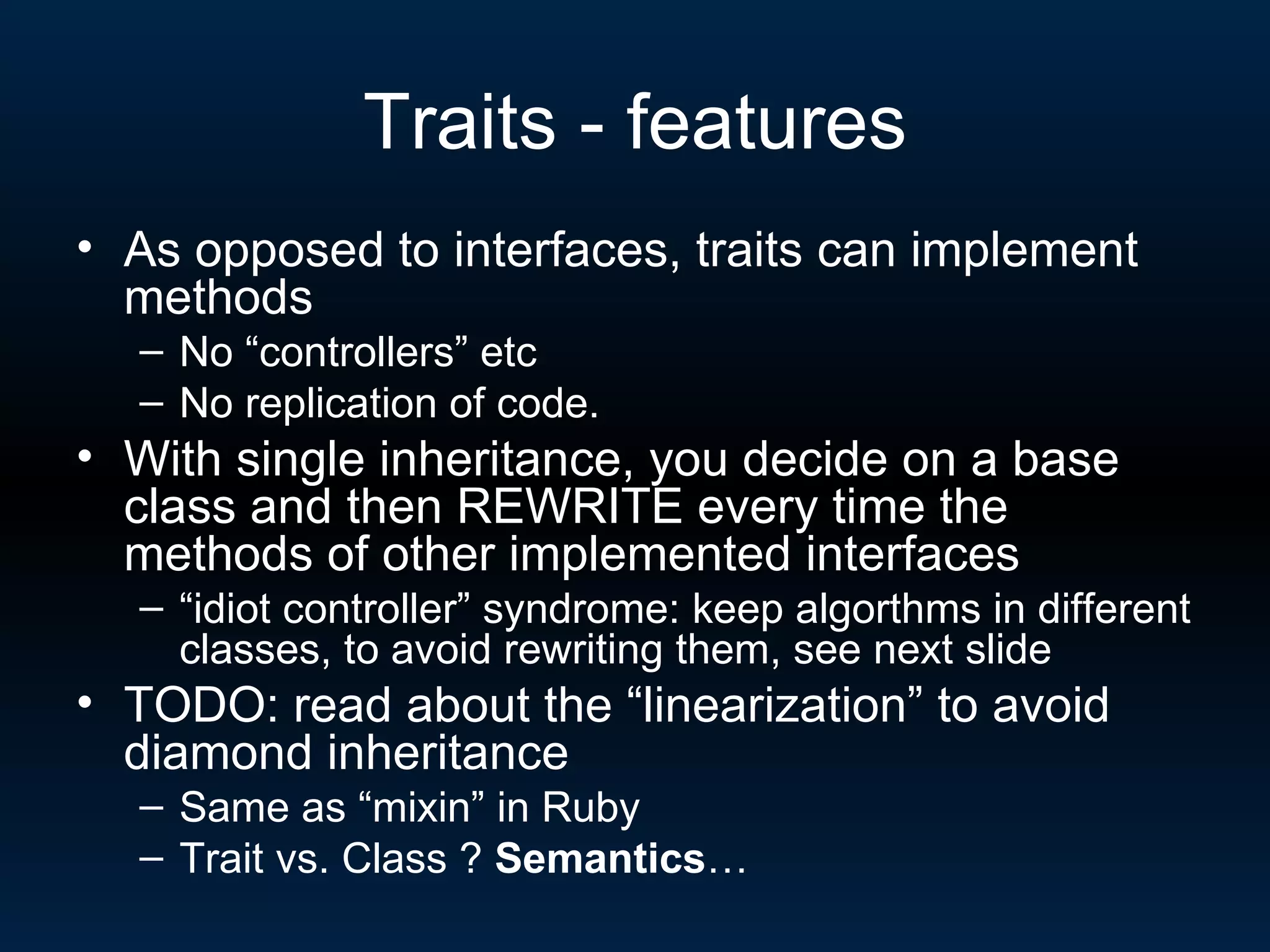

![The screwyness of it trait AnotherCentered { def center:Point def offset (offsetBy:Point) = center += offsetBy } class AnotherShape extends AnotherCentered { override val center:Point = new Point(0,0) } // type parameters Class MyContainer [T :> SomeBaseClass] { var internal = new List[T] def += (t:T) = internal += t } Values/variables and functions share the same namespace Generics Uses [] instead of () (use () instead of [] as well) Operator overloading](https://image.slidesharecdn.com/scala-1234561616732071-2/75/Scala-brief-intro-9-2048.jpg)


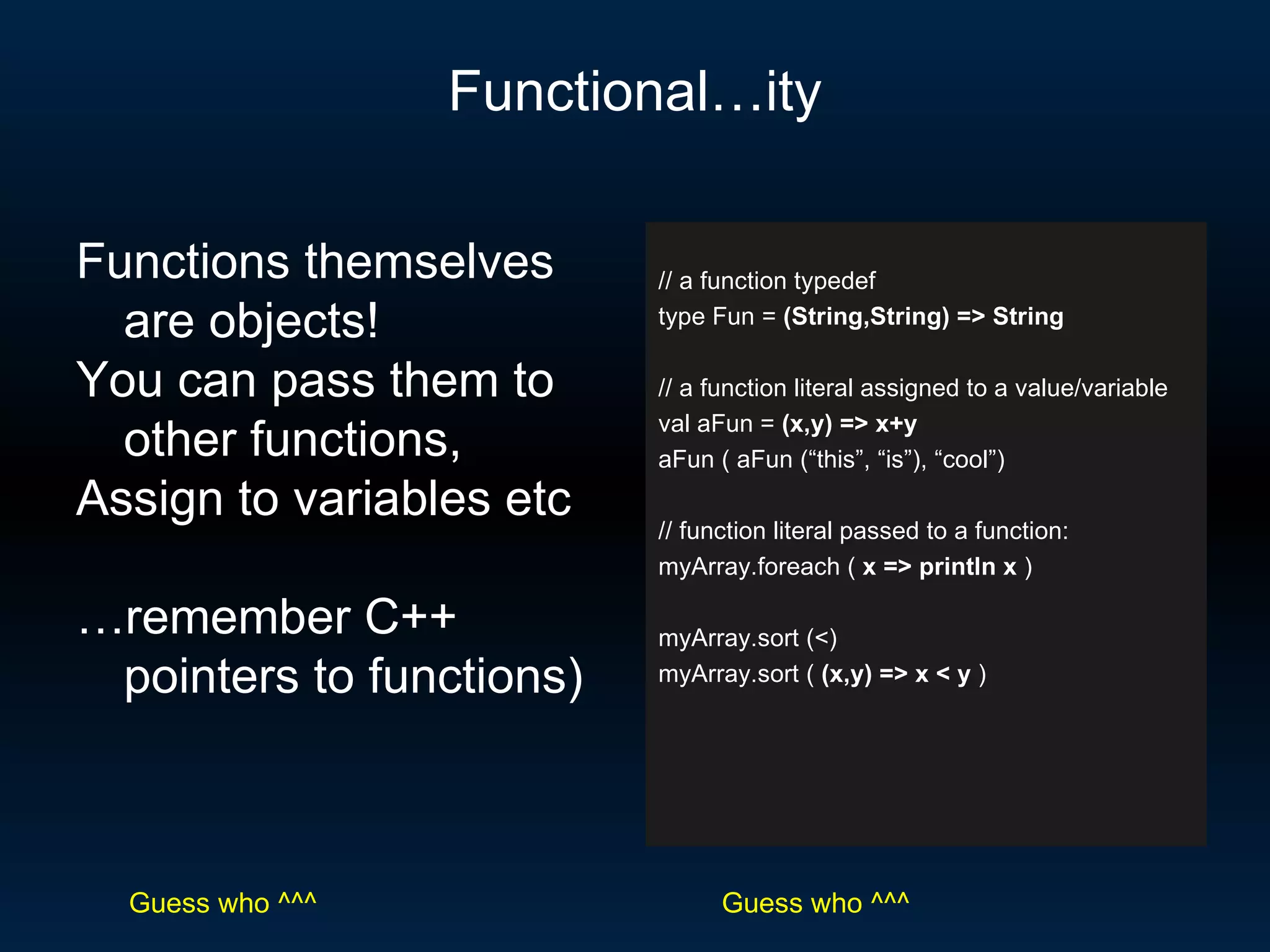

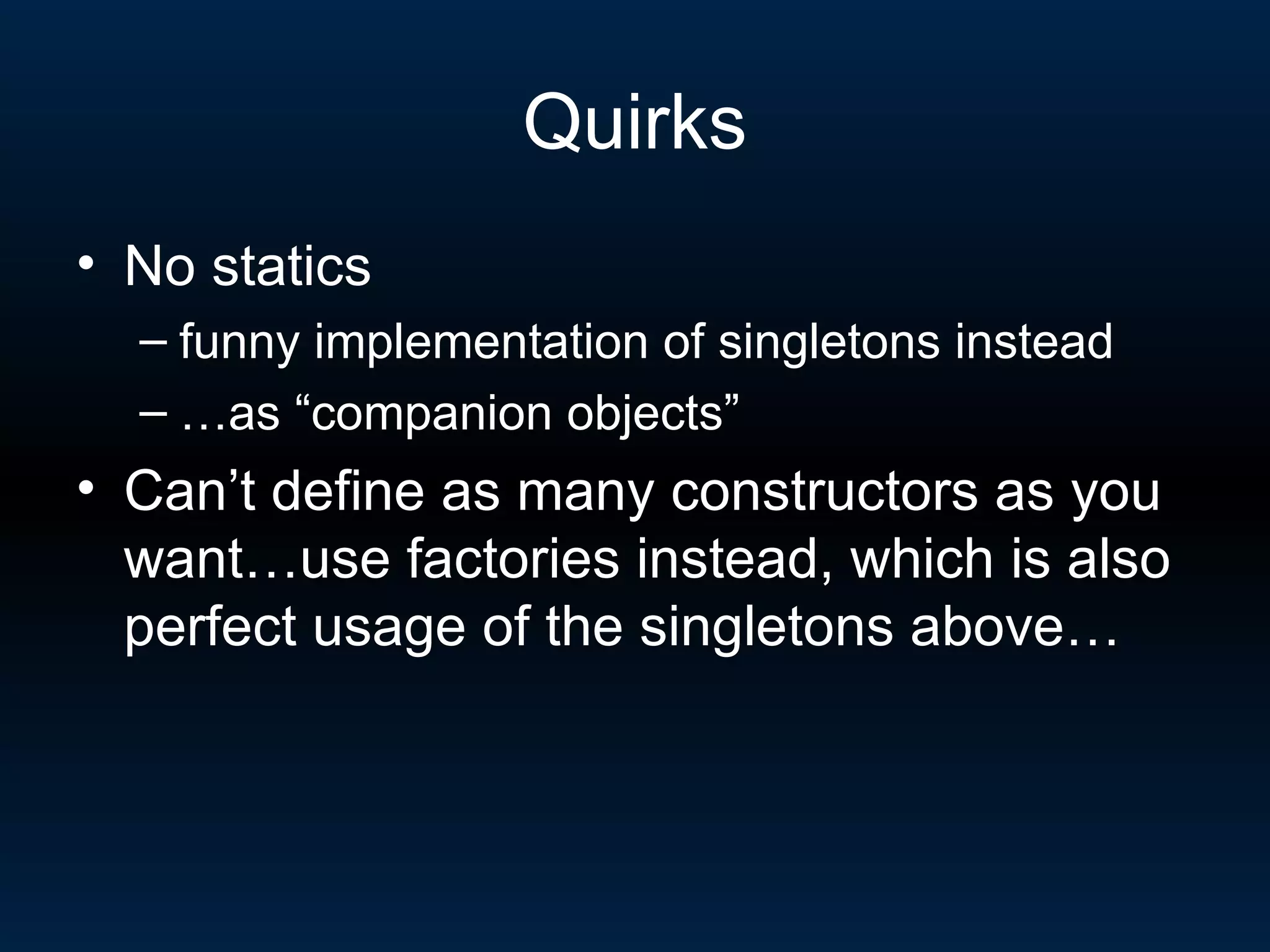
![Quirks // as a value val abs = if (x < 0) 0–x else x // or as a function – remember? val absfun = (x:int) => if (x < 0) 0–x else x myValue.asInstanceOf [OtherClass] implicit def itos (x:Int) : String = String.valueOf(x) // check this out: def repeat[T] (n: Int) ( what: => T ): List[T] = ... repeat(5) { println(“I will be quiet in class."))) } Every statement block returns a value Typecasts : Implicit type conversions Special syntax: Guess who ^^^ Guess who ^^^](https://image.slidesharecdn.com/scala-1234561616732071-2/75/Scala-brief-intro-15-2048.jpg)
![Apply() and bound functions //simple OBJECT to time a statement… note this is not a class !!! apply() behaves differently object Time { def apply[T] ( action: => T ): (T, Long) = { startTimer() val resp = action() val time = stopTimer() (resp, time) } // using it: val (response, ms) = Time(Http.get("http://scala-blogs.org/")) // it works because the http.get(xxx) above is a bound function not an actual call Time(x) is defined via the apply() method Special syntax to bind tuples The Http.get() is NOT a call but a bound function Guess who ^^^ Guess who ^^^](https://image.slidesharecdn.com/scala-1234561616732071-2/75/Scala-brief-intro-16-2048.jpg)
![UnitTests class TestRazElement extends JUnit3Suite { def testA = expect ("roota") { doc a "name" } def testXpe = expect ("11") { doc xpe "/root/parent[@name='1']/child[@name='11']" a "name" } } Several ways to write tests. Compatible with JUnit, NGUnit etc Guess who ^^^ Guess who ^^^](https://image.slidesharecdn.com/scala-1234561616732071-2/75/Scala-brief-intro-17-2048.jpg)
![Apply() and bound functions //simple OBJECT to time a statement… note this is not a class !!! apply() behaves differently object Time { def apply[T] ( action: => T ): (T, Long) = { startTimer() val resp = action() val time = stopTimer() (resp, time) } // using it: val (response, ms) = Time(Http.get("http://scala-blogs.org/")) // it works because the http.get(xxx) above is a bound function not an actual call Time(x) is defined via the apply() method Special syntax to bind tuples The Http.get() is NOT a call but a bound function Guess who ^^^ Guess who ^^^](https://image.slidesharecdn.com/scala-1234561616732071-2/75/Scala-brief-intro-18-2048.jpg)
